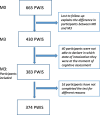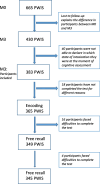Episodic memory and inhibitory control in people who inject substances results of cohort COSINUS study
- PMID: 40898189
- PMCID: PMC12406460
- DOI: 10.1186/s12888-025-07223-2
Episodic memory and inhibitory control in people who inject substances results of cohort COSINUS study
Abstract
Background: Cognitive disorders associated with addictive disorders are well established in the literature for numerous substances and behaviours. Very few studies have examined the effect of polydrug use on cognitive functioning. These studies have focused on the cognitive effect of one substance among others in very small samples. They did not take into account HCV/HIV infections, which are highly prevalent among polydrug users due to frequent injections and sharing of materials and whose impact on cognition is well documented. In our study, we aim to investigate two critical cognitive functions in the addiction process, memory and inhibitory control, in a population of people who inject substances (PWIS).
Method: Thanks to the COSINUS Cohort, we evaluated polydrug use of PWIS, inhibitory control, and memory in 383 PWIS by administering the Go/No-go test and the 5-word test. PWIS were recruited in drug consumption rooms (DCRs) and harm reduction facilities.
Results: 93% of PWIS are polydrug users. Our findings demonstrate typical effects of substance use on memory, revealing a deficit associated with age, along with risky alcohol and cannabis use, while showing a potential benefit from the use of psychostimulants. We found a positive impact of educational level on impulsivity. PWIS who request job assistance and education training exhibit lower free recall compared to the others. HCV/HIV infections are associated with a negative effect on cognition, but the results are mixed. DCR attendance is associated with a positive effect on both memory and inhibitory control.
Conclusion: Our study confirms the importance of screening for cognitive deficits in polydrug users, improving specific treatment for cognitive deficits in PWIS through appropriate mental health care, and encouraging multidisciplinary harm reduction and psychiatry care.
Keywords: Cognition; Cognitive disorders; Drug consumption room; HCV/HIV infections; Polydrug use; Precariousness.
© 2025. The Author(s).
Conflict of interest statement
Declarations. Ethics approval and consent to participate: The study protocol was approved by the Institutional Review Board (IRB00003888) of the French Institute of Medical Research and Health (opinion number: 14–166). Consent for publication: Participants provided oral informed consent and the consent have been signed by the interviewer. In view of the use of illegal substances, the ethics committee has requested that no identifying marks be visible on the consent forms. Competing interests: The authors declare no competing interests.
Figures


References
-
- Lalanne L, Laprevote V, Danion JM, Bacon E. Theoretical reflection on the place of memory and temporal cognitive mechanisms in addictive disorders. Encephale. 2016;42(3):264–9. 10.1016/j.encep.2014.10.027. - PubMed
-
- Dalley JW, Everitt BJ, Robbins TW. Impulsivity, compulsivity, and top-down cognitive control. Neuron. 2011;69(4):680–94. 10.1016/j.neuron.2011.01.020. - PubMed
-
- Paasche C, Weibel S, Wittmann M, Lalanne L. Time perception and impulsivity: a proposed relationship in addictive disorders. Neurosci Biobehav Rev. 2019;106:182–201. 10.1016/j.neubiorev.2018.12.006. - PubMed
MeSH terms
LinkOut - more resources
Full Text Sources

